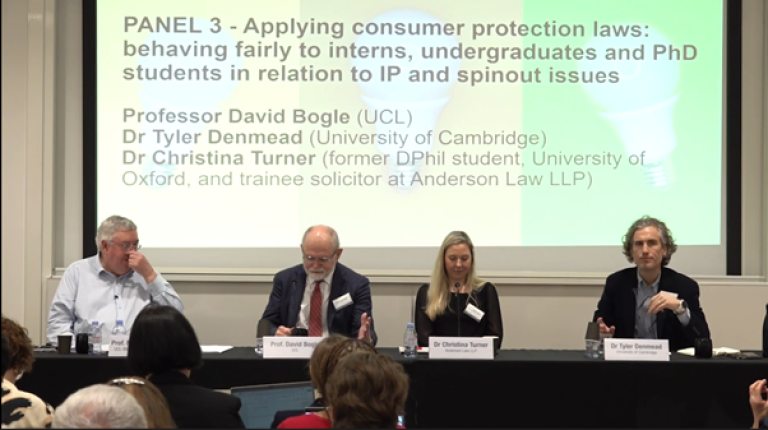Conference held on the Universities and Commericalisation
16 February 2024
On 15th February, IBIL hosted the 'Universities & Commercialisation' conference, bringing together a range of speakers from academia, knowledge transfer professionals and elsewhere, to consider how best to treat students, interns, academics and universities fairly.

On 15 February 20024, IBIL hosted a conference at the UCL Faculty of Laws, entitled 'Universities & Commercialisation: Implications of the Oxford Case'. Chaired by Mark Anderson, Honorary Professor of Practice at UCL Laws, and member of IBIL, and attended by over 160 in-person (and more watching on-line from around the world), the conference's aim was to explore the implications of a recent court decision and the policy issues raised by the government-sponsored Tracey/Williamson review review for how universities operate, and how they interact with academics, students and interns.
The Oxford case, a landmark decision of the English High Court in December 2022, was one of the first occasions on which a UK university has taken on a company in major commercial litigation, and won. The dispute was about outstanding royalties under a patent licence agreement. The court ordered the company to pay Oxford outstanding royalties of £700,000, together with Oxford’s legal costs of nearly £1,000,000. Although it started as a simple debt claim, the way the defendant brought its case raised many other legal and cultural issues. The court made important decisions on themes that had not been litigated in the English courts before, including:
- that an intern was employed to invent, so that their inventions belonged to the university
- that a PhD student was a consumer, and the university had acted fairly to that consumer (as required by consumer protection law) in relation to its IP, revenue sharing and equity policies
- that a university could take a non-commercial view of spinout opportunities, based on its charitable objectives
- that there was no evidence that Oxford’s policy on equity stakes hindered the formation of spinout companies, contrary to a common investor complaint.
The conference brought together experts from UCL and from other organisations that are involved in knowledge creation, protection and commercialisation, the formation of spinout companies, and the relationships between universities, their academic staff, students and interns, thereby providing the different perspectives of senior academics, university managers, lawyers working in the sector, regulators, investors and spinout company executives. Speakers included:
- Athene Blakeman, General Counsel, Oxford Science Enterprises plc
- Professor David Bogle, Pro-Vice Provost, UCL Doctoral School
- Dr Phil Clare, CEO, Queen Mary Innovation Ltd
- Tomas Coates Ulrichsen, Director, University Commercialisation & Innovation Policy Evidence Unit, University of Cambridge
- Dr Tyler Denmead, Associate Professor, University of Cambridge
- Dr Matt Fisher, Senior Lecturer, UCL Laws; Co-director of the UCL Institute of Brand and Innovation Law
- Angela Fouracre, Partner, Bristows LLP
- Alice Frost, Director of Knowledge Exchange, Research England
- Dr Mairi Gibbs, Oxford University Innovation
- Colin Hunsley, Director at Inspired Licensing Ltd
- Dr Anne Lane, CEO, UCL Business Ltd
- Dr Lucinda Miller, Associate Professor, UCL Laws
- David Palfreyman, Director of the Oxford Centre for Higher Education Policy Studies
- Toby Riley-Smith KC, Henderson Chambers
- Dr Jonathan Soderstrom, Chief Licensing Advisor, Wilsom, Sonsini, Goodrich and Rosati
- Phil Thorpe, Deputy Director and Hearing Officer, UK Intellectual Property Office
- Greg Wade, Head of Innovation Policy, Universities UK
- Dr Kathryn Walsh, Executive Director, UCL Innovation & Enterprise.
As a follow-up to the conference, IBIL offered to collate university policies on IP and knowledge transfer and make them available to other universities. This will enable university representatives to compare their policies with those of their peers, and see if they are missing any points, or wish to update any of their policies, particularly in light of the Oxford case i.e. to facilitate the gathering of helpful factual information for the benefit of the knowledge transfer community (and not, for example, to benchmark or offer any standards or best practice). Those universities wishing to contribute are invited to send the current (or old and recently updated their policies) to: ibil@ucl.ac.uk. You can access the policies submitted here.
Find out more about the conference and the speakers here or watch a recording of the panels here.
 Close
Close

